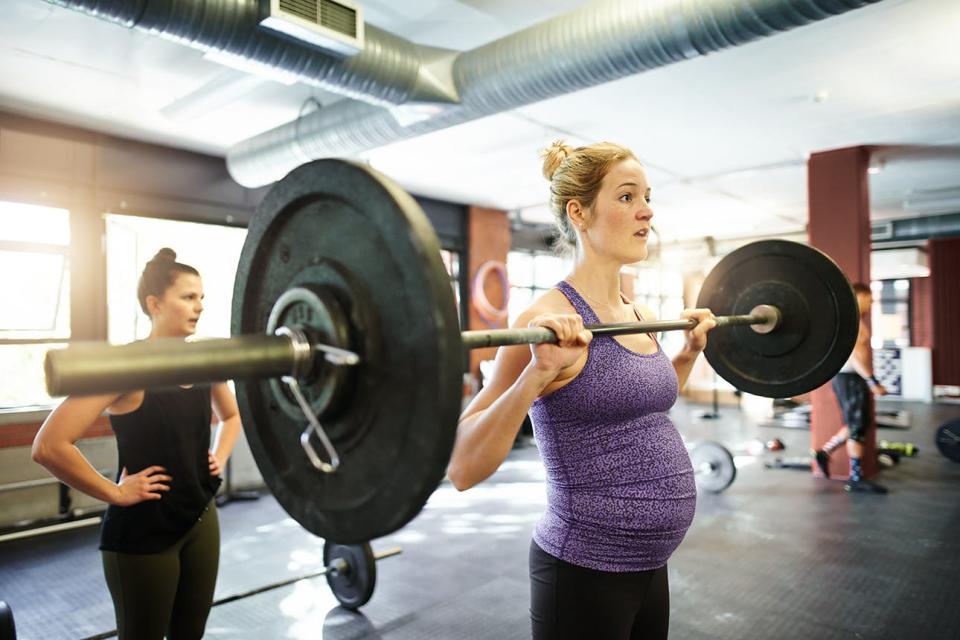Is It Safe to Strength Train During Pregnancy?
As every pregnant person knows, the nine months of baby-making come with a lot of restrictions. No alcohol, no roller coasters, no hot tubs, and (supposedly) no heavy lifting. But while it might be kind of nice to have strangers carry your groceries for you or get out of helping a friend move for the umpteenth time, the idea that you can’t lift anything heavier than a diaper bag during pregnancy can be a bummer. If you already love the endorphin rush of strength training, do you really have to give it up just because you have a bun in the oven? Or, if you’ve never lifted before, are you forbidden from starting until after baby arrives?

To get the lowdown on pregnancy and weightlifting, we spoke to celebrity personal trainer brothers and founders of HOMAGE Fitness Eric and Ryan Johnson, whose clients include A-listers like Scarlett Johansson, Olivia Cooke, and Patina Miller. With over 10 years in the fitness industry, this duo has worked with celebs throughout their pregnancies to help them lift safely. And they have good news: For most healthy women, strength training can be part of the pregnancy fitness package.
Concerns About Pregnancy and Weightlifting
If you’ve gotten the impression that barbells and baby bumps shouldn’t mix, you’re not alone. For ages, folk wisdom has held that any type of overexertion — especially bearing down on the abdomen — could make the uterus contract, leading to preterm labor. In reality, though, research on the link between heavy lifting and premature birth is mixed. According to a statement from the American College of Obstetricians and Gynecologists, an analysis of 62 reports showed “small or null effects” of heavy lifting on scary complications like early delivery, low birth weight, and preeclampsia. (On the other hand, a Danish study of more than 62,000 women found that lifting more than 20 kilograms (or 44 pounds) 10-plus times a day was associated with preterm birth.)
Another major concern for many moms-to-be is that pregnancy-related physical changes might make strength training extra dangerous. “Week by week, as that baby grows in size from a poppy seed to an avocado and beyond,” says Eric, “the woman’s center of gravity gradually shifts forward in relation to their base of support.” This off-kilter sense of balance could definitely make you more likely to biff it during a squat thruster or lunge.
Added to this, the body produces a hormone called relaxin during pregnancy, which loosens joints in preparation for delivery, making you potentially more prone to injury. “Hypermobility, combined with less stability, could be a painful combination,” Eric notes.
Obviously, these concerns mean you’ll need to be extra careful about hitting the weights when you’re expecting, but according to Eric and Ryan, it doesn’t mean lifting during pregnancy is out of the question.
Guidelines for Strength Training During Pregnancy
If strength training was already a part of your fitness regimen pre-baby bump, Eric and Ryan confirm you should be good to continue. Clients they’ve trained through pregnancy have been able to keep up similar levels of lifting, making small adjustments as needed. And despite the party line that pregnancy isn’t the time to start a weightlifting practice, you may not have to wait until you’re postpartum to introduce some lat pulls or Arnold presses. “If the mother-to-be is feeling good, having a healthy pregnancy, and fueling her body properly, there’s no reason why beginning a simple strength training program would be problematic,” says Ryan. “Start slow, and progress at a slow pace. It’s better to underdo it than it is to overdo it when you’re first starting out.”
For both novice and experienced lifters, Ryan suggests bringing in a pro who can help you meet your edge — and keep you from getting hurt. “The safest way to begin a strength training program while pregnant is to hire a professional that has worked in the prenatal/postnatal space before.”
On the whole, say both trainers, the main thing to remember is that weightlifting during pregnancy is an individual decision and should be approached mindfully. “The most important piece of advice is to figure out what works best for you,” says Ryan. “That means figuring out what exercises you enjoy and make you feel good, versus ones that may potentially make you uncomfortable — even if you’ve enjoyed them in the past.” And, as with any exercise program, check with your doctor to get the all-clear before beginning to lift.
Benefits of Weightlifting During Pregnancy
Though, for some women, the baby-on-board condition may not be the right time to start strength training, many of its benefits seem custom-made for pregnancy. For one thing, going beast mode at the gym can be a major stress reliever. “Strength training can certainly help reduce stress and release more endorphins to make you feel better,” says Eric. “Weight training that incorporates functional movement patterns — squats, hip hinge, lunge, push, pull, loaded carry —is a eustress, or a positive stress.” Sounds like a good plan for those days exhausted, feeling-big-as-a-house days.
Additionally, many weight-bearing exercises improve posture. When you’ve got a little person taking up space in your core, better posture could be the key to feeling more comfortable, breathing better, and reducing back pain. Plus, the toning and conditioning of strength training can get your body rockstar-ready for delivery. So, once you get the green light from your medical provider, don’t be afraid to find the strength training workout that works for you.
RELATED: Don’t Fall for These 5 Myths About Women and Weightlifting
(Photo via Getty)


